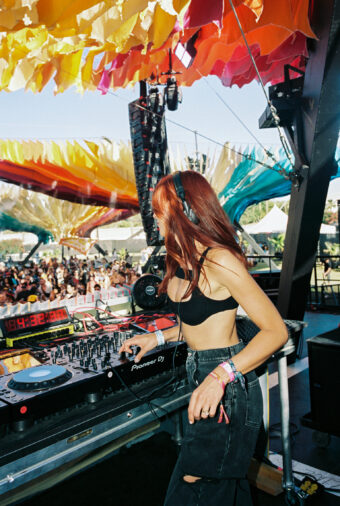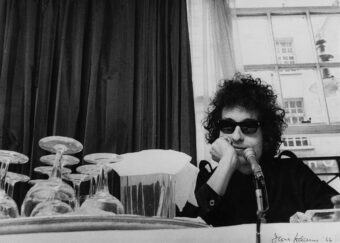Release Date: January 21, 2014
Label: Rough Trade
The first and last time I saw Spiritualized — seated in the balcony of Hollywood’s Palace Theatre on November 12, 1997, during the Ladies & Gentleman We Are Floating in Space tour — I fell asleep. My friends razzed me accordingly, and with good reason: This was freakin’ Spiritualized in 1997, arguably at the height of their powers. How could anyone nod off in the presence of such next-level exploratory ambient shoegaze post-punk radicalness? All these years later, Warpaint’s lovely and harrowing sophomore album suggests an answer: There is a fine line between sleep and hypnosis, between faded and fading, and if as a band you choose to exist on that line, you risk leaving your listeners dozing instead of dazed.
Now, Warpaint, though a bit noodly and navel-gazing, are nonetheless well-respected. Formed in 2004, they gigged around L.A. for five years before releasing the Exquisite Corpse EP, followed by 2010 full-length debut The Fool. Both were spooky-psychedelic, drenched in reverb and distinguished by ethereal vox (mostly from lead singer Emily Kokal) that sounded equally inspired by the Ronettes and Rosemary’s Baby. Four years later, we get Warpaint: demoed in Joshua Tree, recorded in Echo Park, and for the first time, written by the quartet as a unit. The growth is immense, occasionally breathtaking, and always immediate: You hear each note as if you’re sitting right there in the room with candles glowing and incense burning, a vibe achieved with no small amount of help from veteran producer Flood (rarely has a ride cymbal been so meticulously recorded).
And so, the sonics here are lovingly crafted, the vibe mournful and lysergic. But goodness gracious does this thing wander around aimlessly in parts, like that friend who took too many mushrooms and won’t come back to the party.
We start with “Intro,” a brief track that hiccups ten seconds in as someone calls out, “Sorry!” and then drummer Stella Mozgawa counts the thing off again, a not-so-subtle reminder that we’re doing this together in a studio as a band; one’s enjoyment of Warpaint seems to hinge on one actively imagining the four of them being all chummy and collaborative, moreso than most other bands, hence the album’s cover art (courtesy Chris Cunningham, husband of bassist/video artist Jenny Lee Lindberg) that depicts all four women superimposed atop one another. They’re like a single consciousness, got it? Or perhaps more of a coven, given that this music is hushed, eerie, and haunting, socked in a kind of emotional fog, full of foreboding textures, etc. — it heightens the experience to imagine a little toil and trouble percolating underneath.
Anyway, so things are going along just fine. “Keep It Healthy” is a real muscle-flexer, with an elliptical guitar riff, Kokal’s forlorn moan, and the record’s secret weapon: the rhythm section of Lindberg and Mozgawa, who have a kind of “Riders on the Storm” Manzarek/Densmore mind-meld thing going throughout. (Actually, the Doors generally are a good touchstone here.) And while “Love Is to Die” doesn’t quite work as a instantly memorably “single,” it’s nonetheless as catchy as Warpaint get, with a chorus — “Love is to die / Love is to not die” — that grows on your brain like peat moss.
It’s at this point, however, that we take a left turn at somewhere other than Albuquerque. “Hi” and “Biggy” are both constructed around single riffs that go round and round, the former a bass line, the latter some leftover synth sound from an Ed Wood movie; both songs are all mood and not much melody, whereas Warpaint’s sweet spot is the combination of both. “Teese” fares better in this regard, with a slinking boom-bap beat and winsome nah-nah-nahs, but taken together, the album’s midsection feels like that of a novel that hasn’t quite figured out what the plot’s about.
Thankfully, “Disco // Very” disrupts the stupor: It’s dance-punk mixed for a haunted house, so that when the band sings, “Don’t you battle / We’ll kill you / Rip you up/ Tear you in two,” the feeling is appropriately discomfiting. “CC” echoes this vibe, except Kokal turns the perniciousness on herself: “You’ve got me so sick / Spinning / Dizzy.”
And so a theme emerges: disorientation, self-inflicted and/or brought on by love or loving someone, and a widening gyre of inner turmoil, all mirrored musically with varying degrees of success, but nowhere better than on penultimate track “Drive,” which, after an album of vertiginous misdirection, builds from a straightforward point A to point B, offering one of the album’s most satisfying fusions of lyrics and melody, the song building to a crescendo as Kokal sings, “Surprised I finally could feel it / That I’m a lucky charm.” Finally, a perfect balance of entropy and coherence. It has a destination, and it gets there, and you don’t nod off along the way.





